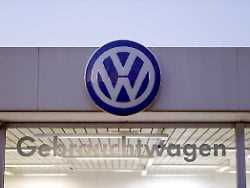Dieselgate claims statute-barred
VW used car owners get nothing
2/10/2022, 6:37 p.m
If you complain too late, the court will punish you. This applies immediately to all owners of a used VW diesel who sought compensation too late in the emissions scandal. Your claims are time-barred, the BGH judged. A vote is still pending for new cars.
Buyers of a used car affected by the diesel scandal, who have waited too long to sue VW for damages, are ultimately left with nothing. The Federal Court of Justice (BGH) in Karlsruhe ruled that the prerequisites for so-called residual damages, which can still exist in certain cases when the statute of limitations has expired, are not met here. For new cars, the question is still open. The top civil judges also decided when it was grossly negligent not to check whether your own car was affected by the scandal. This is important for the question of when claims against VW become time-barred.
A supreme court judgment on residual damages was eagerly awaited, because the topic is now at the center of the legal dispute surrounding the scandalous VW EA189 engine. At the BGH, a large part of the diesel revisions currently coming in revolve around this. According to Volkswagen, the topic affects a total of almost 10,000 ongoing proceedings, in more than 70 percent of the cases it is about cars bought used – the outcome is now mapped out here. There should also be a decision for the new cars soon. Another BGH senate is negotiating this on February 21.
The residual compensation is regulated in Section 852 of the German Civil Code. According to this, there can still be claims after the statute of limitations has expired if “the person liable to pay compensation has obtained something through a tortious act at the expense of the injured party”. The thinking behind it: No one should make a profit from having harmed someone else just because they didn’t complain in time.
However, the regulation does not apply to a used diesel with the VW scandal engine EA189, as the BGH judges have now decided. VW had “already realized any advantage by putting the vehicle on the market as a new car”. In the case of resale, on the other hand, the Wolfsburg-based car manufacturer does not participate directly or indirectly in the profit. One cannot argue that the damage is passed on, said the presiding judge Rüdiger Pamp at the verdict.
Volkswagen hopes for a similar verdict for new cars
VW announced that the group sees its legal opinion confirmed. “Volkswagen’s value chain is not affected by used car sales by dealers and private individuals.” Almost all higher regional courts had previously seen it that way. The picture is far less clear when it comes to new cars, which will then be discussed in a week and a half. “It remains to be seen how the BGH will answer these legal questions,” says VW. “Volkswagen is of the opinion that § 852 BGB is also not applicable to new car purchases and will explain this position to the BGH.”
In principle, VW is obliged to pay damages in the emissions scandal, as the BGH has long since established. Because millions of diesel cars with the EA189 engine had only passed official tests with the help of fraudulent software – in fact, the cars emitted too many toxins on the road. The customers were also duped. Those affected can demand that their car be taken back, but usage will be deducted from the purchase price. However, claims for damages must be asserted within three years, otherwise they expire.
The diesel scandal was blown in autumn 2015. In any case, lawsuits were possible until the end of 2018. However, many did not go to court until 2019 or later. These plaintiffs can only point out that they didn’t notice anything at first or that they only realized later that their car was also affected. According to the law, the period begins to run from the point in time at which “the creditor becomes aware of the circumstances giving rise to the claim and the person of the debtor or should have become aware thereof without gross negligence”.
“From the end of 2016 gross negligence is present”
In the second part of their decision, the BGH judges made it clear for the first time that gross negligence is to be assumed from the end of 2016. The statute of limitations in these cases ends at the end of 2019.
The diesel scandal was a huge topic in the media in the first few months. In October 2015, VW launched an online portal where customers could check whether their car was also affected. Pamp spoke of “obvious information options” that would have given cause for research at least until the end of 2016. “Not to have done so was grossly negligent.”
At the same time, the judges refused to draw the line earlier, i.e. at the end of 2015. Waiting was “not absolutely incomprehensible” at this point, according to the decision. At least there is “no serious breach of duty”. One of the plaintiffs benefits from this, whose case has to be examined again at the Stuttgart Higher Regional Court (OLG), his claims may not even be statute-barred. In the four other cases, which also came from the OLG Stuttgart and the OLG Koblenz, the lawsuits were only filed in 2020 – too late.
